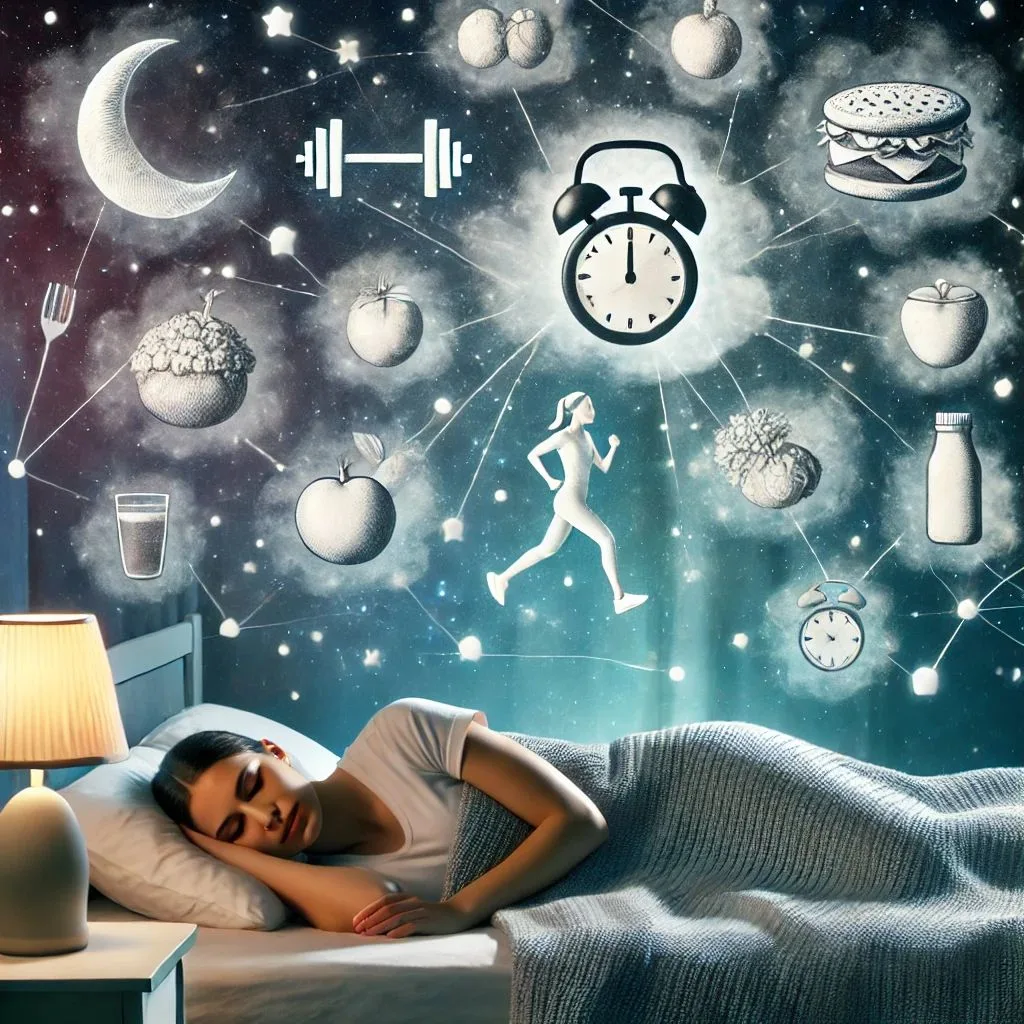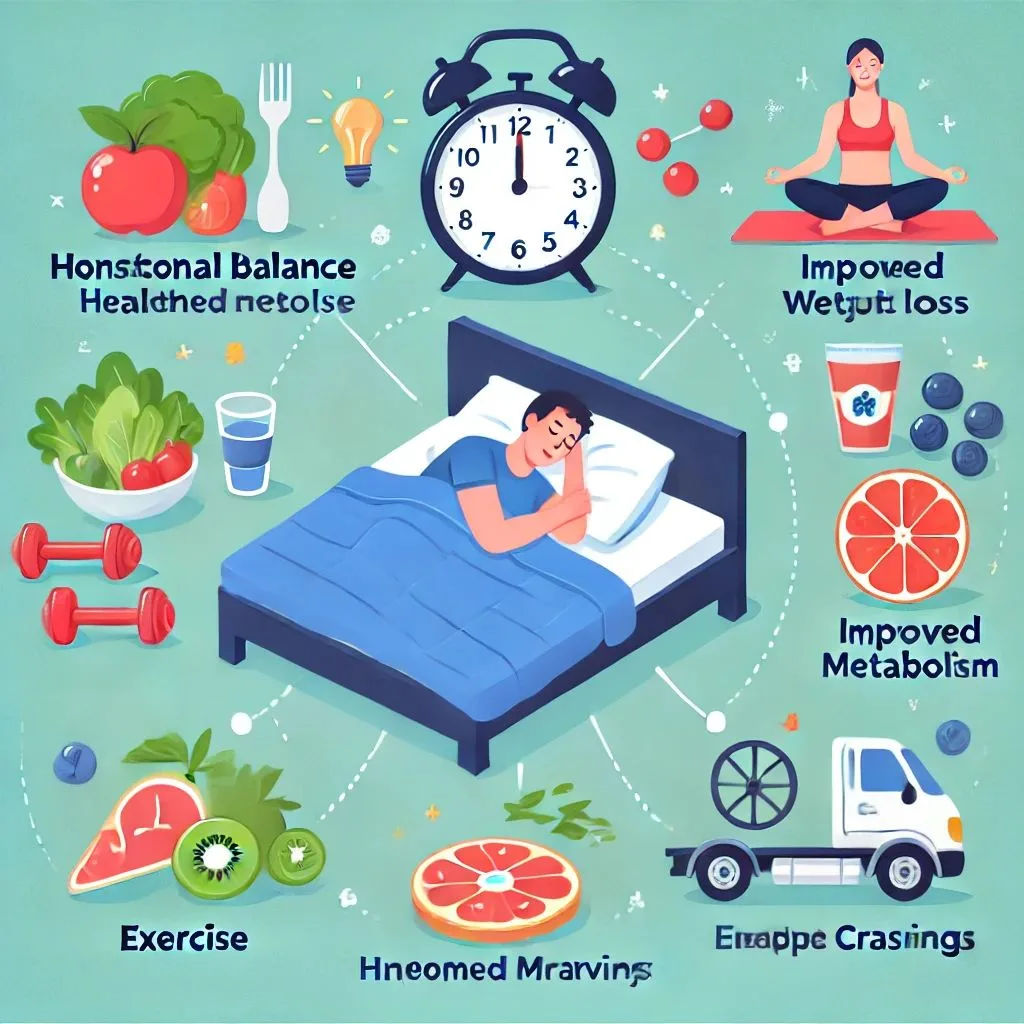Table of Contents
Toggle
When it comes to weight loss, many people focus on diet and exercise. While these are critical components, one essential factor often overlooked is sleep. Research has increasingly highlighted sleep and weight loss connection, showing that the quality and duration of your rest can significantly influence your weight loss efforts.
This blog explores the fascinating link between sleep and weight loss. It explains how better rest can accelerate your journey to a slimmer, healthier you.
The Science Behind Sleep and Weight Loss Connection

Sleep plays a crucial role in regulating your metabolism, hormones, and overall body function. Here’s how it impacts weight loss:
1. Hormonal Regulation
Sleep directly influences the hormones responsible for hunger and appetite:
-
- Ghrelin: Known as the hunger hormone, ghrelin levels increase when you’re sleep-deprived, making you feel hungrier.
-
- Leptin: This hormone signals fullness to your brain. Sleep deprivation lowers leptin levels, causing you to eat more.
By disrupting this balance, poor sleep can lead to overeating and hinder weight loss efforts.
2. Metabolism and Energy Use
Sleep affects your body’s ability to process glucose, which is essential for energy. Insufficient sleep reduces insulin sensitivity, leading to fat storage instead of fat burning.
3. Cravings and Food Choices
When sleep-deprived, your brain’s reward centers become more active, making you crave high-calorie, sugary, and fatty foods. This can derail your slimming goals.
How Poor Sleep Affects Weight Loss Progress

The connection between sleep and weight loss becomes even clearer when you examine how poor sleep sabotages your goals:
1. Increased Calorie Intake
Lack of sleep often leads to late-night snacking and larger portion sizes, adding unnecessary calories to your daily intake.
2. Reduced Physical Activity
Feeling tired from inadequate sleep reduces motivation and energy for exercise, making it harder to burn calories.
3. Slower Recovery
Sleep is essential for muscle recovery. Poor sleep hampers the body’s ability to repair itself, leading to decreased workout performance and slower progress.
4. Stress and Cortisol Levels
Sleep deprivation raises cortisol levels, a stress hormone that promotes fat storage, particularly in the abdominal area.
Tips to Improve Sleep for Better Weight Loss

The sleep and weight loss connection is undeniable, and improving your sleep can significantly enhance your results. Here’s how to ensure you are getting quality rest:
1. Set a Consistent Sleep Schedule
Aim to go to bed and wake up at the same time every day, even on weekends. This helps regulate your body’s internal clock.
2. Create a Sleep-Friendly Environment
-
- Keep your bedroom cool, dark, and quiet.
-
- Invest in a comfortable mattress and pillows.
-
- Remove electronic devices that emit blue light, which can disrupt sleep.
3. Limit Stimulants Before Bed
Avoid caffeine, nicotine, and heavy meals in the evening, as they can interfere with your ability to fall asleep.
4. Incorporate Relaxation Techniques
Practice deep breathing, meditation, or gentle yoga to relax your mind and body before bed.
5. Monitor Your Sleep Patterns
Use apps or fitness trackers to identify patterns and make necessary adjustments to your routine.
Real-Life Benefits of Addressing Sleep and Weight Loss Connection

Case Study: The Impact of Sleep on Weight Loss Success
Jane, a 35-year-old working professional, struggled to lose weight despite maintaining a strict diet and workout plan. By prioritizing 7-8 hours of sleep each night, she noticed the following changes:
-
- Reduced cravings for junk food.
-
- Improved energy levels for workouts.
-
- Faster weight loss results.
Jane’s experience highlights how addressing the sleep and weight loss connection can lead to tangible benefits.
Conclusion
The sleep and weight loss connection is more significant than many realize. By prioritizing quality sleep, you can enhance your metabolism. Quality sleep helps you control your appetite. It boosts your energy levels. All these factors contribute to successful weight loss.
Achieving your ideal weight isn’t just about what you eat. It’s also about how you exercise. It’s crucial to consider how well you rest. Start prioritizing your sleep today to see the results you’ve been striving for in your slimming journey.
Written by Vijay Budhlakoti for Slim Down Guide
Frequently Asked Questions (FAQs)
How many hours of sleep are ideal for weight loss?
Most adults need 7-9 hours of quality sleep per night to support weight loss and overall health.
Can poor sleep lead to weight gain?
Yes, insufficient sleep disrupts hormones like ghrelin and leptin, increasing hunger and calorie intake, which can lead to weight gain.
Does napping help with weight loss?
Short naps (15-30 minutes) can improve alertness and reduce fatigue but should not replace nighttime sleep.
What foods promote better sleep?
Foods like bananas, almonds, oats, and chamomile tea contain nutrients that help relax the body and improve sleep quality.
How soon will improving sleep show results in weight loss?
You may notice changes within a few weeks, including better energy levels, reduced cravings, and improved exercise performance.

